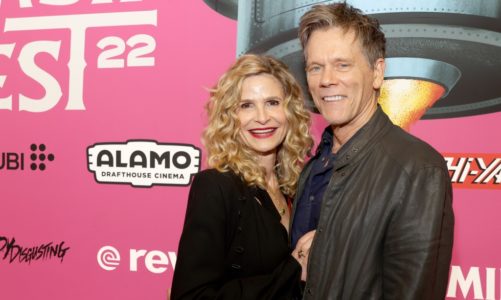Julia Wolfe never thought she’d write an oratorio about women’s suffrage. In fact, when she first considered it, she found the subject daunting.
“It’s such a long history, such a big story,” Wolfe said in a recent phone call from New York.
A few years back, though, she was asked to compose a new piece on the subject — and suddenly knew that she wanted to do it.
Now “Her Story,” Wolfe’s 40-minute work for orchestra and women’s chorus, comes to the Bay Area. Composed on commission for the San Francisco Symphony and four additional orchestras, the work, which has been performed in Nashville, Chicago, and Boston, makes its West Coast premiere on a San Francisco Symphony program May 25 and 27, conducted by Giancarlo Guerrero and featuring the Boston-based women’s chamber chorus Lorelei Ensemble. The program also includes Rimsky-Korsakov’s “Scheherazade.”

Despite her initial reservations, Wolfe may have been the ideal composer to take on the subject of suffrage: Throughout her career, the Philadelphia-born, New York-based artist has made new works on historical themes. Her “Anthracite Fields,” which won the 2015 Pulitzer Prize for music, explored the lives of Pennsylvania coal miners; in 2019, she premiered “Fire in My Mouth,” about New York’s tragic 1911 Triangle Shirtwaist Fire. A co-founder of New York’s contemporary music group Bang on a Can, her composing style fuses classical forms with 20th-century minimalism and the insistent power of rock.
For “Her Story,” Wolfe researched multiple sources, including advertisements and political texts dating from the struggle for women’s suffrage, writings by abolitionist Sojourner Truth, and others.
But she said she found one piece especially inspiring — a 1776 letter from Abigail Adams to her husband, John Adams, urging him, as he was writing his influential “Thoughts on Government,” to consider women’s rights. “Do not put such unlimited power into the hands of husbands,” Abigail wrote: “Remember, all men would be tyrants if they could.”
Today, Wolfe — noting that this country has yet to ratify the Equal Rights Amendment — says those words “felt very current. I thought what she wrote was so striking — shocking, really. She was so ahead of her time.”
The decades-long fight for women’s suffrage ended on August 18, 1920, with the 19th Amendment to the Constitution ratified, finally giving women the right to vote.
Wolfe started “Her Story” just as the anniversary of suffrage was coming up – a time that coincided with the start of the Covid-19 pandemic. “That was a strange parallel,” she recalled. “I’d started working on the piece, had a good chunk of it underway – then the pandemic hit and all the shows were cancelled.
“In a way, the silver lining was that I had a lot of time to work on this piece. I really disappeared into my little cave, and thought more deeply about it. I don’t know if I would have had that kind of time otherwise. I was able to really burrow in and work on it.”
The Lorelei Ensemble was an integral part of the piece from the start, she added. “They’ve been amazing,” Wolfe said. “They’re really multi-tasking in this – singing a pretty challenging score, at the same time moving, lifting signs up, doing physical motions in response to the text, moving into different positions throughout.”
Stage director Anne Kauffman, she said, has been essential in developing the work’s theatrical impact; so has Guerrero, who conducted the world premiere in Nashville and will lead the San Francisco performances.
“He really built the piece with us, and he’s been a huge partner in this process,” she said. The National Symphony in Washington, D.C., the fifth of the five commissioners, will present the work at a date to be announced.
If “Her Story” looks to the past, it’s another step forward for Wolfe, whose music has crossed boundaries with each new work while always finding a groove.
“I love rhythm, and I’m certainly a child of rock and roll too,” she said. “I took piano lessons as a kid, but the music I listened to growing up was more American folk and rock. Then I got into experimental music. I’ve been very influenced by Steve Reich, Meredith Monk, composers who returned to this love of groove and rhythm and pulse. So this is definitely a fusion of the music I love. I love harmony, but rhythm is propulsive to me.”
Note: May 25 performance includes a post-concert talk with Wolfe, Guerrero, and Lorelei Ensemble’s Beth Willer.
Contact Georgia Rowe at growe@pacbell.net.
SAN FRANCISCO SYMPHONY
Presents “Her Story,” by Julia Wolfe
When: 7:30 p.m. May 25 and 27
Where: Davies Symphony Hall, 201 Van Ness Ave., San Francisco
Tickets: $35-$135; 415-864-6000; www.sfsymphony.org
𝗖𝗿𝗲𝗱𝗶𝘁𝘀, 𝗖𝗼𝗽𝘆𝗿𝗶𝗴𝗵𝘁 & 𝗖𝗼𝘂𝗿𝘁𝗲𝘀𝘆: www.mercurynews.com
𝗙𝗼𝗿 𝗮𝗻𝘆 𝗰𝗼𝗺𝗽𝗹𝗮𝗶𝗻𝘁𝘀 𝗿𝗲𝗴𝗮𝗿𝗱𝗶𝗻𝗴 𝗗𝗠𝗖𝗔,
𝗣𝗹𝗲𝗮𝘀𝗲 𝘀𝗲𝗻𝗱 𝘂𝘀 𝗮𝗻 𝗲𝗺𝗮𝗶𝗹 𝗮𝘁 dmca@enspirers.com




